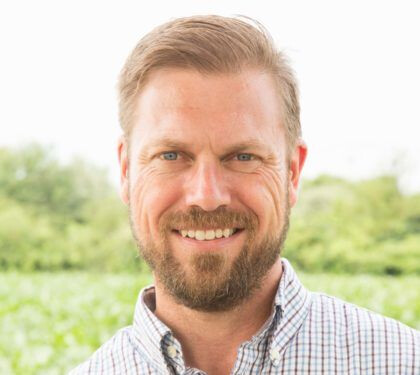Five Tips for Springing into Soil Health
The early days of spring are when many farmers make final management decisions for the growing season ahead – including how to improve the health of their soil in a way that improves resiliency and their bottom-line.
Since 2011, American Farmland Trust has been collaborating with local partners to work with farmers on the East End of Long Island to experiment with conservation practices that help protect water quality without sacrificing farm viability.
Like most things, getting started can be the hardest part. In celebration of Earth Month, we’re sharing five tips from the field to help guide farmers to develop sound farming practices.
#1. Get to Know Your Soil
Arguably the most important step towards improving soil health is getting to know your farm’s unique soils. If you conducted a soil test last fall, pull out the results and identify some opportunities to improve your soils with new practices this year. Soil health tests, like Cornell University’s Comprehensive Assessment of Soil Health, or CASH, test, can be taken in the spring when the ground has thawed.
The Assessment includes biological and physical indicators to identify constraints and guide prioritization of management practices that will build your soil health.
#2. Find Local Partners
If you are just getting started, it is recommended that you seek assistance from an agricultural service provider. Your local ag retailers and consultants can provide a wealth of knowledge. In addition, there are organizations across New York who can help you with various aspects of soil health. Your local Cornell Cooperative Extension office, County Soil and Water Conservation Districts, and Natural Resources Conservation Service staff are available to help farmers seeking technical or financial assistance to implement conservation practices. Many of these groups offer soil health field days and workshops to learn and network with other growers.
#3. Test a New Practice
Considering a new cover crop or reducing tillage in a certain rotation? You can get started with a side-by-side comparison plot this year to see how the practice compares to your traditional method in the same crop. Watch a short video featuring two Long Island vegetable growers sharing what they learned trying different conservation practices on their farms. Your local Cooperative Extension agent can help you with setting up your plot.
#4. Track the Results and Cost
When it comes to farming practices, it’s important to get a full picture of the results and savings. In addition to tracking your expenses, record the time and labor investments given to each field. You might be surprised how certain practices affect how many trips you make over the field with equipment, saving fuel and labor, or how one field recovers more quickly from severe weather.
As John Zilnicki says in the video, “Cover crops down the road are going to save us inputs. Up front this might cost us a little more, but down the road less fertilizer, suppressed weeds, that’s going to save us money.” Vegetable grower Phil Schmitt found that he saves over $33 per acre per year when he switched to using a zone builder and controlled release nitrogen fertilizer. There are other savings that cannot be accounted for such as greater infiltration, reduced water and wind erosion, and resiliency to extreme weather events.
#5. Evaluate and Plan for Next Year
Building soil health takes time. You may not see the results you want in a year, and that’s okay! At the end of the season, reflect on what went well and what you might do differently next year.
For more information please contact Aaron Ristow, American Farmland Trust agricultural stewardship program manager for New York at [email protected] or call (607) 745-7165.
Photo Credit: Lindsay Morris




